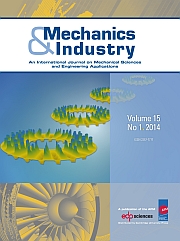Crossref Citations
This article has been cited by the following publications. This list is generated based on data provided by
Crossref.
Zhang, Xiu Li
Yin, Zhong Wei
Jiang, Dan
and
Gao, Geng Yuan
2014.
Comparison of the Lubrication Performances of Water-Lubricated and Oil-Lubricated Plain Journal Bearings.
Applied Mechanics and Materials,
Vol. 711,
Issue. ,
p.
27.
Gao, Ting
He, Chi
Fan, Zhao Jun
and
Guo, Hong Li
2014.
Analysis and Evaluation of Artillery Fire Simulation Test.
Key Engineering Materials,
Vol. 620,
Issue. ,
p.
632.
Zhang, Xiuli
Yin, Zhongwei
Gao, Gengyuan
and
Li, Zheng
2015.
Determination of stiffness coefficients of hydrodynamic water-lubricated plain journal bearings.
Tribology International,
Vol. 85,
Issue. ,
p.
37.
Wang, Yanzhen
Yin, Zhongwei
Jiang, Dan
Gao, Gengyuan
and
Zhang, Xiuli
2016.
Study of the lubrication performance of water-lubricated journal bearings with CFD and FSI method.
Industrial Lubrication and Tribology,
Vol. 68,
Issue. 3,
p.
341.
Zhang, Xiuli
Yin, Zhongwei
Jiang, Dan
Gao, Gengyuan
Wang, Yanzhen
and
Wang, Xinbo
2016.
Load carrying capacity of misaligned hydrodynamic water-lubricated plain journal bearings with rigid bush materials.
Tribology International,
Vol. 99,
Issue. ,
p.
1.
Zhang, Yanyan
Yang, Lihua
Li, Zhi
and
Yu, Lie
2016.
Research on static performance of hydrodynamically lubricated thrust slider bearing based on periodic harmonic.
Tribology International,
Vol. 95,
Issue. ,
p.
236.
Yin, Wei
Lu, HongYu
Zheng, YeLong
Liu, ZheYu
Han, ZhiWu
and
Tian, Yu
2016.
Influence of water and oil immersion on the tribological properties of Excentrodendron hsienmu.
Science China Technological Sciences,
Vol. 59,
Issue. 11,
p.
1673.
Wang, Yanzhen
Yin, Zhongwei
Gao, Gengyuan
and
Zhang, Xiuli
2017.
Analysis of the performance of worn hydrodynamic water-lubricated plain journal bearings considering cavitation and elastic deformation.
Mechanics & Industry,
Vol. 18,
Issue. 5,
p.
508.
Lin, Xiaohui
Jiang, Shuyun
Zhang, Chibin
and
Liu, Xiang
2018.
Thermohydrodynamic Analysis of High-Speed Water-Lubricated Spiral Groove Thrust Bearing Using Cavitating Flow Model.
Journal of Tribology,
Vol. 140,
Issue. 5,
Zhang, Xiuli
Gao, Gengyuan
Yin, Zhongwei
Wang, Yanzhen
and
Gao, Chao
2018.
Numerical analysis and experimental research on load carrying capacity of water-lubricated tilting-pad thrust bearings.
Mechanics & Industry,
Vol. 19,
Issue. 2,
p.
201.
Wu, Zhenpeng
Nguyen, Vanliem
Zhang, Zhihong
and
Zeng, Liangcai
2019.
Study on curved surface design of sliding pair based on stepped topography model.
Industrial Lubrication and Tribology,
Vol. 72,
Issue. 1,
p.
86.
Liang, Xingxin
Yan, Xinping
Ouyang, Wu
and
Liu, Zhenglin
2019.
Experimental research on tribological and vibration performance of water-lubricated hydrodynamic thrust bearings used in marine shaft-less rim driven thrusters.
Wear,
Vol. 426-427,
Issue. ,
p.
778.
Lin, Xiaohui
Wang, Ruiqi
Zhang, Shaowen
Zhang, Chibin
and
Jiang, Shuyun
2019.
Study of Cavitation Bubbles Evolution for High-Speed Water-Lubricated Spiral Groove Thrust Bearings.
Journal of Tribology,
Vol. 141,
Issue. 5,
Bai, Yuxing
Pan, Bo
and
Shen, Yong
2020.
Thermohydrodynamic performance of water-lubricated thrust bearing of mine high speed rescue pump.
IOP Conference Series: Materials Science and Engineering,
Vol. 740,
Issue. 1,
p.
012037.
Huang, Qianwen
and
Yan, Xinping
2020.
Impact factors on lubricant performance of stern bearing with misalignment angle induced by transverse vibration of shaft.
Ocean Engineering,
Vol. 216,
Issue. ,
p.
108051.
Wei, Yuan
Tomkowski, Robert
and
Archenti, Andreas
2020.
Numerical Study of the Influence of Geometric Features of Dimple Texture on Hydrodynamic Pressure Generation.
Metals,
Vol. 10,
Issue. 3,
p.
361.
Lin, Xiaohui
Wang, Shun
Jiang, Shuyun
and
Zhang, Shaowen
2020.
Thermohydrodynamic Model of Cavitating Flow and Dynamic Characteristic Calculation for High-Speed Water-Lubricated Pump-Out Spiral Groove Bearing.
Tribology Transactions,
Vol. 63,
Issue. 4,
p.
736.
Bai, Zhishan
Hu, Xiaoxue
Wang, Bingjie
Hu, Ziqiang
Yang, Xigang
and
Zhao, Tianbiao
2020.
Optimization of shaft-seal water system of cutter suction dredger based on high-efficiency centrifugal separation technology.
Separation and Purification Technology,
Vol. 236,
Issue. ,
p.
116267.
Liu, Changjiang
Gao, Gengyuan
Gu, Xiaomei
and
Zhang, Fei
2021.
Study on Lubrication Performance of Composites Water-Lubricated Stern Bearing.
Journal of Physics: Conference Series,
Vol. 2002,
Issue. 1,
p.
012024.
Nijssen, J.P.A.
Faludi, J.
and
van Ostayen, R.A.J.
2021.
An eco-impact design metric for water lubricated bearings based on anticipatory Life Cycle Assessment.
Journal of Cleaner Production,
Vol. 321,
Issue. ,
p.
128874.

